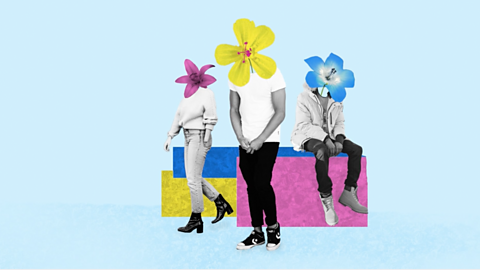This article is part of a suite of content produced as part of Teen 23 day, looking at some of the issues affecting young people aged 13-18 in Britain today.
Teen 23 is a survey conducted in the summer of 2023 by Bitesize and ТщЖЙдМХФ Radio 5Live, where over 2000 teenagers answered questions about the issues important to them. Forty-five percent of the 13-18 year olds surveyed said they feel anxious тsome of the timeт. We all have moments where we feel anxious, low, worried or nervous, but how do you know if what you're going through is more than should be expected?
We asked Dr Sheila Redfern, Consultant Clinical Child and Adolescent Psychologist at The Anna Freud Centre, about how we can recognise the signs of anxiety and depression and when it might be time to seek help from a trusted adult. Here is her advice:

Itтs great to feel a buzz from being with your friends, or playing your favourite music or sport т nothing beats that feeling of pure happiness т so why shouldnтt you try and feel that way all the time? First off, itтs not normal to be happy all of the time and every single one of us experiences dips in our mood and spikes in our anxiety. Itтs part of life. Anxious thoughts and feelings and low mood are not illnesses. They are signals that we humans have evolved and these feelings tell us when to lie low and avoid danger.
If something upsetting happens to you, you should expect to feel sad or low about this for a while. Say a close friend moves away from you, or an elderly relative who you loved dies т itтs entirely expected, and even helpful to you, that you should feel very sad.
Trying to push these feelings away or trying to make yourself happy, maybe because you think this is how other people want you to feel, is not going to help you recover from these life events. You get sad or anxious for a reason because these feelings help you to reflect on and process lifeтs difficulties. It's helpful to you to learn how to manage, or regulate, your feelings, because this will help you in other areas of your life, such as helping you to manage relationships. Being unhappy or anxious is, sadly, part of life and these feelings are not diseases. Letтs look at anxiety first:
Why do we get anxious?
A small amount of anxiety is not only normal but often quite helpful. For example, when youтre taking a test, you need a certain level of anxiety to get your adrenaline going so youтre alert enough to focus on the test and work a bit quicker than you would usually do when youтre more relaxed. Equally, most people feel anxious when they go into a new situation, such as a new class, school or even to a party where you donтt know many people. Being a little bit anxious helps you to focus and be more aware of your surroundings. It can even help you to stay safe. But what about when you get so anxious you canтt think straight and you start to get physical symptoms such as sweaty hands, a sick feeling in your tummy, dizziness? When you focus on worrying thoughts т for example, тIтm going to stand out at this party, I shouldnтt have worn these shoesт т these anxious and negative thoughts cause your body to react, so you might find your heartrate quickens, you feel more hot than usual, and your mind is racing. This probably means youтre starting to panic, and your anxiety is getting a bit beyond your control. At these times, anxiety becomes a problem because itтs getting in the way of you living your life and doing everyday things.
What can you do to manage anxiety?
The worst thing to do is to run away т even though thatтs what you may want to do т and avoid the thing thatтs making you anxious. It only makes the anxiety bigger. Here are some ways you can manage anxiety:
Talk to someone you trust.
Get enough sleep т set a sleep routine for yourself by setting up a bedtime reminder on your phone and an alarm to wake up at the same time every day. If you have a set sleep schedule and feel rested, you are more likely to be able to deal with everyday anxious thoughts.
Move around т walking or running three or more times every week while listening to music or a podcast at the same time can bring your anxiety levels down.
Challenge your thoughts by тre-writing the scriptт. For example, try changing that thought about the party to something more rational and accurate, say, тI donтt know if I wore the right shoes, but everyone worries about their appearance and my friends like me whatever Iтm wearing and probably wonтt even be looking at my shoes. Iтll focus on talking with my friends instead.т
Try to control your breathing т when weтre anxious, we start to breathe faster and from our chest rather than our diaphragm (in our tummy). Take slower breaths through your nose then stop, hold this breath and count to five before you blow the breath out through your mouth. By slowing down your breathing, you will immediately start to feel calmer.
Why do we get depressed?
Itтs totally normal to feel sad, even quite low, at times in your life. The difference between feeling sad or low and feeling depressed is to do with the extent to which your feelings interfere with your everyday life. For example, if youтre feeling sad about something but still feel you can get out of bed, eat with your family, and go to school, then this is a completely normal state of mind and something itтs best just to accept and wait to pass. Accept this state of mind as just another normal, human feeling. If, on the other hand, you feel so low you are finding it hard to sleep, or youтre sleeping too much and canтt wake up, your appetite changes and you just canтt see the point of the things you used to enjoy, then itтs possible youтre depressed. Donтt panic though, because most people will feel depressed at some points during their life and the vast majority of us recover from this period of depression.
What can you do if youтre depressed?
If you have felt very low for a long time т more than a few weeks т things seem pointless and you feel as though youтve got no interest or energy for anything in your life, it might be time to get help from someone. Perhaps you had a significant event happen in your life and you just canтt seem to get over it on your own. These things can help you if youтre feeling depressed:
Talking to someone you trust and who listens and understands how you feel will help. Some people are good at comforting you, helping you to understand what it is you feel, and why. Find someone like this, whether thatтs a parent, trusted friend or adult, or a helpline for young people. Some people will try to dismiss how you feel, cheer you up, or worse just ignore these feelings. These people are not helpful to you.
Youтd be surprised at how many people do feel depressed at some point in their lives, so donтt feel itтs anything to be ashamed about. Itтs common. Opening up to a friend you trust about how you feel might mean you get some tips on what helped them.
1 in 6 young people of your age (11-16) have a mental health disorder. If you are experiencing an episode of depression, there are highly likely to be other people in your close circle who have the same experience. Remember you are not alone and help and support are available.


If you need support
You should always tell someone about the things youтre worried about. You can tell a friend, parent, guardian, teacher, or another trusted adult. If you're struggling with your mental health, going to your GP can be a good place to start to find help. Your GP can let you know what support is available to you, suggest different types of treatment and offer regular check-ups to see how youтre doing.
If youтre in need of in-the-moment support you can contact , where you can speak to a counsellor. Their lines are open 24 hours a day, 7 days a week.
There are more links to helpful organisations on ТщЖЙдМХФ Action Line.

7 signs to look for in a healthy relationship
What are the things you should look for in a healthy relationship?

How happy hormones can help fight stress
Natasha Devon on how to create the happy hormones that help fight stress.

Vaping and peer pressure: what you need to know
We take a look at some of the risks from vaping and how to confidently say no if you get peer pressured to vape.
